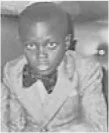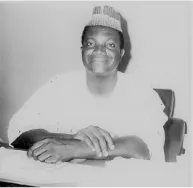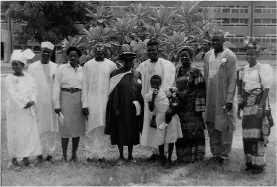![]()
Chapter 1
Beginnings
How can we know who we are and where we are going if we don’t know anything about where we have come from and what we have been through?
– David McCullough (b. 1993)
Early missteps: Before success, experiences in my early years shaped me
It is dinner time at school, with all students (approximately 1000) eating their meals noisily in the big hall. The duty teacher, a boisterous man called Alhaji, shouts out my surname on the tannoy, and instructs that I should stand on the table. This is not a good sign, as it usually marks the beginning of a public humiliation and some punishment. I pay no attention to his instruction. The hall falls silent. I can hear the anger in his voice as he repeats, ‘Omotowa, stand up on your table.’ I continue to refuse. All eyes are on me. He walks up to me and repeats his instruction. I ask him, ‘What have I done that I should be so humiliated?’ He does not answer. The situation escalates as he pulls me by my shirt collar. I say to him, ‘Alhaji, you are choking me’, but he continues to tug. I become dizzy and feel that he is strangling me. At that moment, I decide that I need to free myself before I faint. I turn around, take a swing and hit him. The hall of students erupts in jeers. He is stunned, having been taken completely by surprise. He releases his hold on my collar. I adjust my shirt and walk out.
I knew there would be consequences but I felt I had been unjustly singled out and had not been informed of any offence. Alhaji reported the incident to the school authorities and without listening to any explanation from me, I was suspended from school. I deserved it. This was not good for me – especially having to explain what had happened to my parents. My father, not one to tolerate indiscipline, berated me, ‘This is not how I raised you!’ I felt sad at his admonition as I respected his opinion of me a lot. I was made to stay in my room and study throughout the suspension. I would only leave my room for meals.
I learned that one should not act on impulse but rather reflect on the consequences, to decide on options. This was one of the many lessons that I learned from experiences in my younger years – lessons that would come to be useful guides for me in later life.
This was Federal Government College (FGC) Ilorin, where I attended for my secondary education from 1978 after my primary education at Baboko Primary School. The government had conceived the FGC system in 1974 as part of its post-war effort to reintegrate various ethnic groups. The schools were designed as co-educational and unity institutions where students from all over Nigeria were selected on the basis of quota and merit, to ensure a broad student demographic.
Babs Omotowa (1978)
It was my first experience with such a diverse group, and it fostered a good environment to build lasting friendships and healthy networks, and to gain knowledge of other ethnic group, religions and cultures. I adjusted well to boarding school life. Coming from the home of strict disciplinarian parents, I was something of a model student in the early years. I was active in sports, particularly football (as a goalkeeper), and I was also an active member of the Christian Fellowship. I got good grades until the Third Year.
In the Fourth Year, I began to see the world beyond the strict boundaries my parents had built around me and my siblings. I became more adventurous and was anxious to explore. In a typical example, I became so fascinated with Brazil, for its football prowess and samba festivals, that I fantasized about stowing away on a ship. I shared this fantasy with my brothers, who still remember and occasionally joke about it. It was not until 25 years later, that I was able to visit Brazil. It was fascinating driving round Rio De Janeiro to see the Maracana stadium and eat local cuisine, vatapa, a delicious mixture of bread, shrimp, red pepper, ginger, peanuts and coconut milk. However, there was no samba festival happening, so that remains a fantasy.
Although an introvert, I was keen to spread my wings and try new things, which meant I did not resist the influence of friends at school who introduced me to truancy. On a particular day, I got formal permission to go to the dentist in town. A classmate, Ohis, asked me to buy him a packet of cigarettes. He told me where to buy them and how much they would cost. The shop attendant, unbothered by my school uniform, simply asked me which type I wanted to buy. I did not know the different brands and so asked the attendant for the most popular.
On giving the packet to Ohis, he reeled in laughter; the menthol cigarettes I had bought was viewed as one for ‘softies’. He asked whether I wanted to try a cigarette. I followed him to a secluded part of school where I took my first drag. There he again laughed as I coughed and choked until I got the hang of it. I would go on to smoke for a few years before quitting.
From then on, I was invited to occasional smoking sessions and began to form closer bonds with the ‘bad boys’ in school. Later, I was invited to a lounge where I was introduced to alcohol. I gradually began to miss classes, and often left school without permission as a result of these habits.
My academic performance deteriorated. I went from being a student who was always at the top of the class to being mediocre. My grades continued to decline, but having been a high performer I took it for granted that I was going to do well at the end. I failed the final examinations and had to repeat the Fourth Year. I was shocked.
My parents were disappointed to say the least, considering their background and roots, and what education meant to them.
I learned that past successes were no guarantee of future success. I learned not to take things for granted or rest upon my laurels. I came to understand the impact of the people with whom one associates, and the influence they can have on one’s performance, goals and ambitions.
My roots
My parents trained themselves through school, convinced that getting a good education was a lever to enable them break away from harsh realities of poverty in the village and from their ancestral agrarian background. They were dreamers who dreamt of the stars, of rising beyond their village environment and helping to uplift their community. They carried a torch of hope for a better future and understood that achieving their dreams would require them to travel to other developed societies to educate themselves and open them up to new ideas. They had tenacity and vivid purpose from early in life.
To realize his goal, my father worked manually as a farm hand to sponsor his education, including on his father’s farms. He attended preschool and primary school in Kabba, a town next to his village. He then proceeded to Sapele College (170 kilometres away, in current Delta State) before attending Igbaja ECWA Teachers College (a mission school) in 1958. It was during this period at ECWA that he met my mother, who was still in her teenage years. She later attended Kabba Women Teachers College before they got married in 1963.
My father earned a scholarship to study at Forah Bay College (university) in Freetown, Sierra Leone (3000 kilometres away – a 47-hour road trip) and achieved a Bachelor’s degree in history. He later received another scholarship, to the University of Durham in the United Kingdom, where he earned a Postgraduate Diploma in history. My mother also later earned a Bachelor’s degree in fine arts from Ahmadu Bello University, Zaria, a Master’s degree in art education from New York University (NYU) and a PhD in fine arts from the University of Ilorin.
My father (1980s)
My mother’s PhD graduation – Babs second from right
Education enabled them to achieve in their lives, building successful careers. In the 1960s, my father taught history and English at the Government Secondary School (GSS) Kano and GSS Keffi in the north. He became a principal at GSS Dekina and later at GSS Okene, then rose to become a Director of Education, a position from which he retired in 1985.
He was later appointed Chairman of Kwara State Education Board for four years (1986–90) to oversee hundreds of private and mission-owned primary and secondary schools and 25,000 teachers. He was reappointed to a second four-year term (1990–94), from which he was named Chairman of the newly created Kogi State Schools Board in 1991. Two years later, when he believed that he had achieved the objective of setting the board on a sound footing, he retired to his private and community development interests.
My mother taught at Teachers College, Ilorin, GSS Ilorin and Queen Elizabeth School, Ilorin. She became Vice Principal at GSS Tanke and later GSS Kabba, from which she retired in 1992. She was subsequently appointed a member of Kogi State Schools Board in Lokoja. She was hesitant to accept the appointment as she would be separated from her husband. Lokoja was 175 kilometres from Ilorin, where my father was living. My father encouraged her to accept the appointment, as he believed it was a recognition of her achievements, as well as an opportunity for her to develop and contribute to society.
My parents’ appointments into board roles following their retirement were unsolicited. The recognition had come because they excelled at both their work and their personal development. I learned that focusing on excellence and personal development were key to advancement. Mostly, I learnt from my parents that education is worth more than any material inheritance parents could bequeath to their children.
Based on the role played by education in their lives, they espoused its value to everyone they came across. In the 1980s, my father had invested in a poultry business and experienced large losses. He turned to a certain Alhaji Abaye, a successful poultry farmer in Ilorin, for help. Abaye was a helpful consultant and through his support my father’s poultry business became successful. They developed a close friendship.
After many visits to my father, Abaye – who was non-literate and had not previously considered the education of his children as important – told my father that he noticed that every young person in my father’s home was studying. He interpreted the different circumstances as leading to different future directions for the two different families.
Abaye observed that although he was richer than my father, there was an air of confidence and sense of direction in my father’s children that was lacking in his own children, which he ascribed to education. He asked my father how he got all his children to attend school and take studying seriously, as he wanted the same for his own family. He explained the predicaments of the cultural patterns of his native, social and religious background in contemporary Ilorin.
My father called on his first son, Dele, to guide Abaye’s children. Eventually, two of Abaye’s sons made it to university. One graduated with a Bachelor of Law degree from the University of Ilorin; the other graduated with a Bachelor of Arts degree in English from the University of Jos.
Despite Abaye being non-literate, he understood that education would lead to a better future and that his material wealth may not give his children such a future. His conviction that education creates hope for a better future reinforced my father’s dreams.
Abaye’s story is one from which anyone who may not have the lodestar that my parents provided could learn. Without a solid parenting foundation, it is important to identify in society those considered role models and reach out for mentorship. While there may not necessarily be a positive response from the first contact, with persistence it is possible to achieve success. Abaye changed the trajectory of his children’s future by reaching out to others for mentorship. I was inspired by him, as it takes great humility and courage to seek help.
From my parents, I came to understand the role parents play in the journey of their children, through the values they espouse and their actions. Their examples remain useful guides for my relationship with my own children today. I also understood through my father the role that a husband must play in encouraging and supporting his wife to follow her dreams and reach great heights.
Parental values and senior examples are crucial in the development of children and the younger generation. As a result, it is vital that parents espouse worthy values and examples of good behaviour.
Retracing my steps
I would never forget my father’s words when I presented him with my school report card where I had failed and been asked to repeat. He said calmly, ‘Yemi, I am disappointed in you, you are better than this.’
I was called ‘Yemi’ throughout my primary and secondary school years. Most of my colleagues from that period still call me Yemi today. It was only from my university days that I began to be called ‘Babs’. The genesis of Babs was during the completion of the form for the General School Certificate Examination. The column for one’s name only provided for 21 characters. When I wrote my name, Omotowa Jolayemi Babatunde, there was insufficient room for all the letters. I inserted five more boxes to write all my names in full. However, when the official notification slip came back, it only provided for the 21 boxes, and listed my last name as ‘Baba’. As Baba means ‘Old man’ in my dialect, I sought a different four-letter name and decided on ‘Babs’.
After my school failure, it was clear that I had let the family down. My father was so upset that he did not speak to me for several days. I was withdrawn from the boarding house and commuted to school daily, and had no frills. I was not allowed any social interactions (e.g. TV, outings) and was restricted to my room. I tip-toed around the house and whenever my father returned from the office, I quickly disappeared to my room. The repercussions of failure provided me with a harsh and a bitter lesson.
I felt ashamed and this made me dissociate from my disruptive friends. I focused on my study and my grades improved. I finally graduated in 1984. While my grades were good, I did not make the grade to study medicine, my first choice. Instead, I was admitted to study industrial chemistry at the University of Ilorin.
I learned that to stand a chance, merely desiring a good outcome did not suffice. One needs hard work, perseverance and excelle...



